CNN Tonight interview with Reza Aslan on Islam and violence
VerifiedAdded on 2023/04/26
|6
|2069
|279
AI Summary
Reza Aslan, a scholar of religions, discusses whether Islam promotes violence and the treatment of women in Muslim countries in a CNN Tonight interview. He argues that Islam, like any religion, depends on what individuals bring to it and that painting all Muslim countries with a single brush is a form of bigotry. Aslan also criticizes oversimplifications and irrational statements made by leaders like Benjamin Netanyahu.
Contribute Materials
Your contribution can guide someone’s learning journey. Share your
documents today.
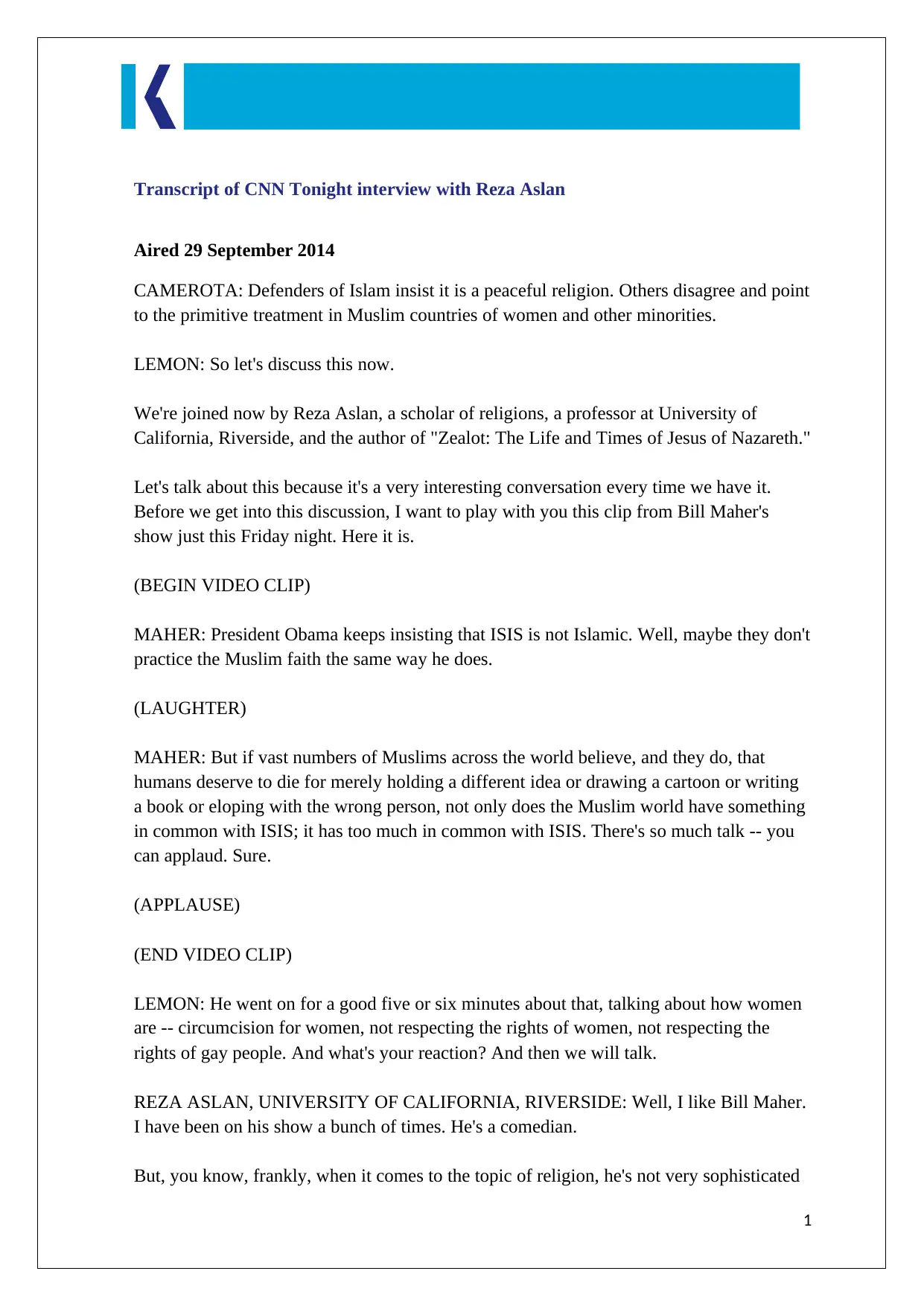
Transcript of CNN Tonight interview with Reza Aslan
Aired 29 September 2014
CAMEROTA: Defenders of Islam insist it is a peaceful religion. Others disagree and point
to the primitive treatment in Muslim countries of women and other minorities.
LEMON: So let's discuss this now.
We're joined now by Reza Aslan, a scholar of religions, a professor at University of
California, Riverside, and the author of "Zealot: The Life and Times of Jesus of Nazareth."
Let's talk about this because it's a very interesting conversation every time we have it.
Before we get into this discussion, I want to play with you this clip from Bill Maher's
show just this Friday night. Here it is.
(BEGIN VIDEO CLIP)
MAHER: President Obama keeps insisting that ISIS is not Islamic. Well, maybe they don't
practice the Muslim faith the same way he does.
(LAUGHTER)
MAHER: But if vast numbers of Muslims across the world believe, and they do, that
humans deserve to die for merely holding a different idea or drawing a cartoon or writing
a book or eloping with the wrong person, not only does the Muslim world have something
in common with ISIS; it has too much in common with ISIS. There's so much talk -- you
can applaud. Sure.
(APPLAUSE)
(END VIDEO CLIP)
LEMON: He went on for a good five or six minutes about that, talking about how women
are -- circumcision for women, not respecting the rights of women, not respecting the
rights of gay people. And what's your reaction? And then we will talk.
REZA ASLAN, UNIVERSITY OF CALIFORNIA, RIVERSIDE: Well, I like Bill Maher.
I have been on his show a bunch of times. He's a comedian.
But, you know, frankly, when it comes to the topic of religion, he's not very sophisticated
1
Aired 29 September 2014
CAMEROTA: Defenders of Islam insist it is a peaceful religion. Others disagree and point
to the primitive treatment in Muslim countries of women and other minorities.
LEMON: So let's discuss this now.
We're joined now by Reza Aslan, a scholar of religions, a professor at University of
California, Riverside, and the author of "Zealot: The Life and Times of Jesus of Nazareth."
Let's talk about this because it's a very interesting conversation every time we have it.
Before we get into this discussion, I want to play with you this clip from Bill Maher's
show just this Friday night. Here it is.
(BEGIN VIDEO CLIP)
MAHER: President Obama keeps insisting that ISIS is not Islamic. Well, maybe they don't
practice the Muslim faith the same way he does.
(LAUGHTER)
MAHER: But if vast numbers of Muslims across the world believe, and they do, that
humans deserve to die for merely holding a different idea or drawing a cartoon or writing
a book or eloping with the wrong person, not only does the Muslim world have something
in common with ISIS; it has too much in common with ISIS. There's so much talk -- you
can applaud. Sure.
(APPLAUSE)
(END VIDEO CLIP)
LEMON: He went on for a good five or six minutes about that, talking about how women
are -- circumcision for women, not respecting the rights of women, not respecting the
rights of gay people. And what's your reaction? And then we will talk.
REZA ASLAN, UNIVERSITY OF CALIFORNIA, RIVERSIDE: Well, I like Bill Maher.
I have been on his show a bunch of times. He's a comedian.
But, you know, frankly, when it comes to the topic of religion, he's not very sophisticated
1
Secure Best Marks with AI Grader
Need help grading? Try our AI Grader for instant feedback on your assignments.
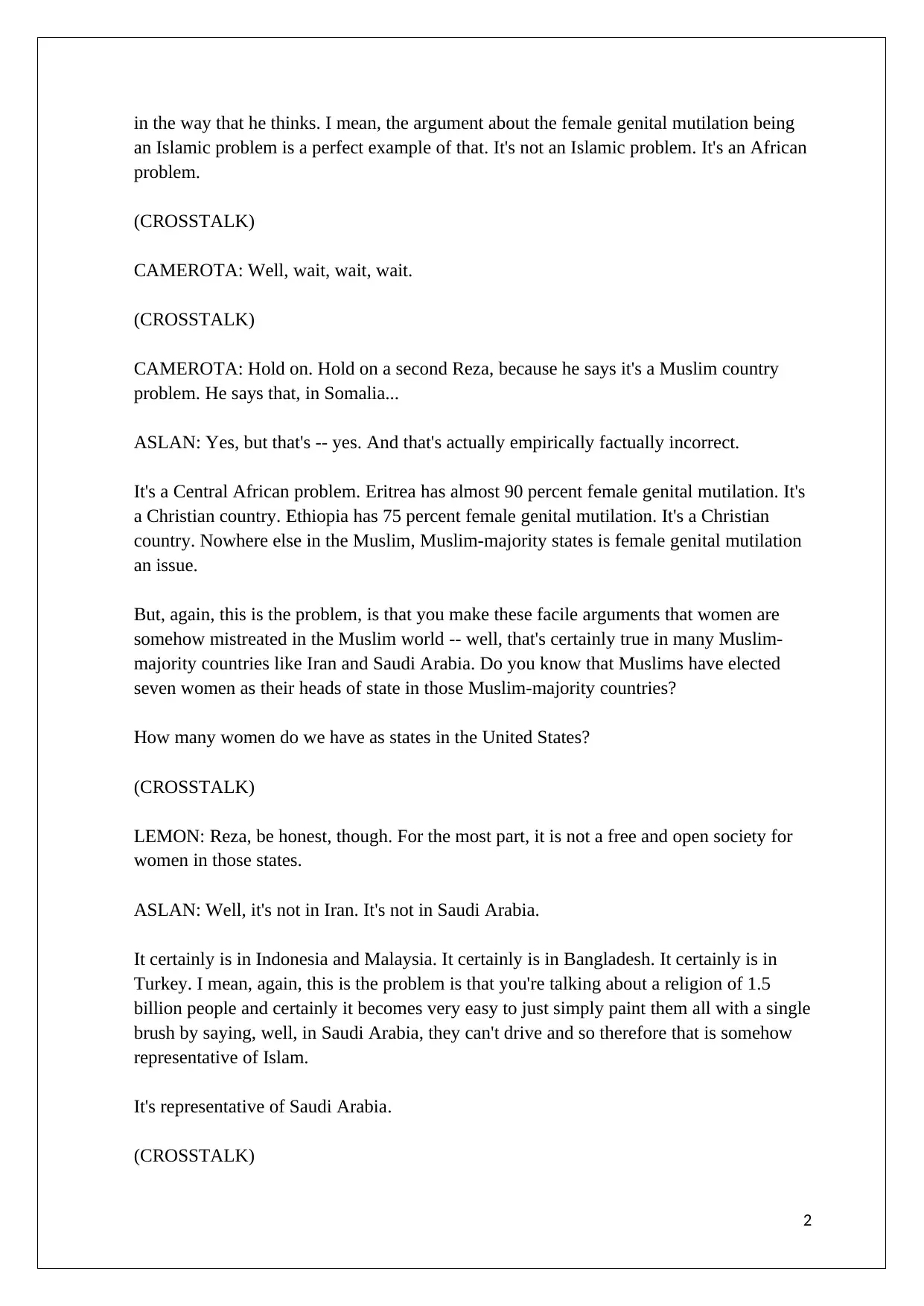
in the way that he thinks. I mean, the argument about the female genital mutilation being
an Islamic problem is a perfect example of that. It's not an Islamic problem. It's an African
problem.
(CROSSTALK)
CAMEROTA: Well, wait, wait, wait.
(CROSSTALK)
CAMEROTA: Hold on. Hold on a second Reza, because he says it's a Muslim country
problem. He says that, in Somalia...
ASLAN: Yes, but that's -- yes. And that's actually empirically factually incorrect.
It's a Central African problem. Eritrea has almost 90 percent female genital mutilation. It's
a Christian country. Ethiopia has 75 percent female genital mutilation. It's a Christian
country. Nowhere else in the Muslim, Muslim-majority states is female genital mutilation
an issue.
But, again, this is the problem, is that you make these facile arguments that women are
somehow mistreated in the Muslim world -- well, that's certainly true in many Muslim-
majority countries like Iran and Saudi Arabia. Do you know that Muslims have elected
seven women as their heads of state in those Muslim-majority countries?
How many women do we have as states in the United States?
(CROSSTALK)
LEMON: Reza, be honest, though. For the most part, it is not a free and open society for
women in those states.
ASLAN: Well, it's not in Iran. It's not in Saudi Arabia.
It certainly is in Indonesia and Malaysia. It certainly is in Bangladesh. It certainly is in
Turkey. I mean, again, this is the problem is that you're talking about a religion of 1.5
billion people and certainly it becomes very easy to just simply paint them all with a single
brush by saying, well, in Saudi Arabia, they can't drive and so therefore that is somehow
representative of Islam.
It's representative of Saudi Arabia.
(CROSSTALK)
2
an Islamic problem is a perfect example of that. It's not an Islamic problem. It's an African
problem.
(CROSSTALK)
CAMEROTA: Well, wait, wait, wait.
(CROSSTALK)
CAMEROTA: Hold on. Hold on a second Reza, because he says it's a Muslim country
problem. He says that, in Somalia...
ASLAN: Yes, but that's -- yes. And that's actually empirically factually incorrect.
It's a Central African problem. Eritrea has almost 90 percent female genital mutilation. It's
a Christian country. Ethiopia has 75 percent female genital mutilation. It's a Christian
country. Nowhere else in the Muslim, Muslim-majority states is female genital mutilation
an issue.
But, again, this is the problem, is that you make these facile arguments that women are
somehow mistreated in the Muslim world -- well, that's certainly true in many Muslim-
majority countries like Iran and Saudi Arabia. Do you know that Muslims have elected
seven women as their heads of state in those Muslim-majority countries?
How many women do we have as states in the United States?
(CROSSTALK)
LEMON: Reza, be honest, though. For the most part, it is not a free and open society for
women in those states.
ASLAN: Well, it's not in Iran. It's not in Saudi Arabia.
It certainly is in Indonesia and Malaysia. It certainly is in Bangladesh. It certainly is in
Turkey. I mean, again, this is the problem is that you're talking about a religion of 1.5
billion people and certainly it becomes very easy to just simply paint them all with a single
brush by saying, well, in Saudi Arabia, they can't drive and so therefore that is somehow
representative of Islam.
It's representative of Saudi Arabia.
(CROSSTALK)
2
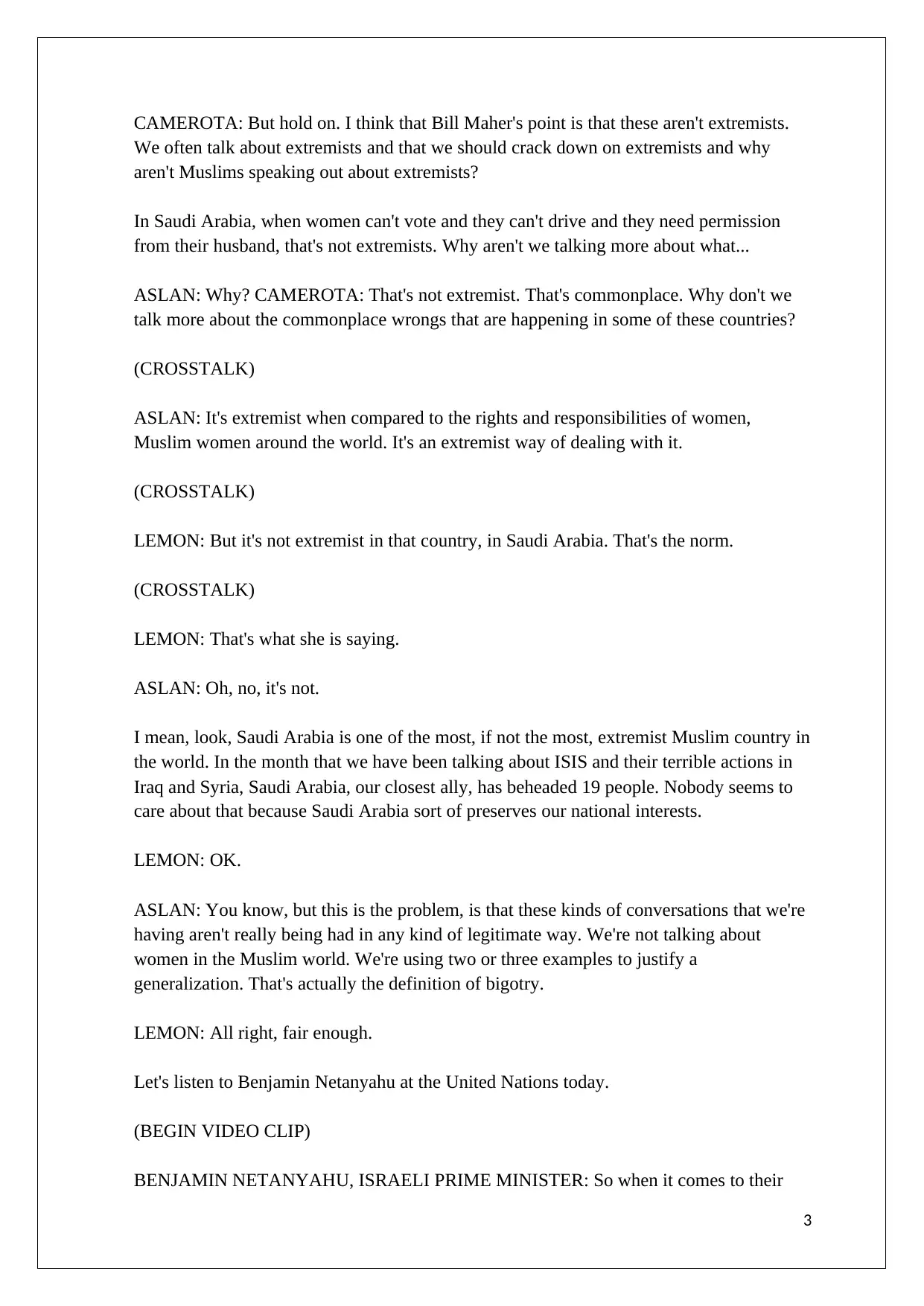
CAMEROTA: But hold on. I think that Bill Maher's point is that these aren't extremists.
We often talk about extremists and that we should crack down on extremists and why
aren't Muslims speaking out about extremists?
In Saudi Arabia, when women can't vote and they can't drive and they need permission
from their husband, that's not extremists. Why aren't we talking more about what...
ASLAN: Why? CAMEROTA: That's not extremist. That's commonplace. Why don't we
talk more about the commonplace wrongs that are happening in some of these countries?
(CROSSTALK)
ASLAN: It's extremist when compared to the rights and responsibilities of women,
Muslim women around the world. It's an extremist way of dealing with it.
(CROSSTALK)
LEMON: But it's not extremist in that country, in Saudi Arabia. That's the norm.
(CROSSTALK)
LEMON: That's what she is saying.
ASLAN: Oh, no, it's not.
I mean, look, Saudi Arabia is one of the most, if not the most, extremist Muslim country in
the world. In the month that we have been talking about ISIS and their terrible actions in
Iraq and Syria, Saudi Arabia, our closest ally, has beheaded 19 people. Nobody seems to
care about that because Saudi Arabia sort of preserves our national interests.
LEMON: OK.
ASLAN: You know, but this is the problem, is that these kinds of conversations that we're
having aren't really being had in any kind of legitimate way. We're not talking about
women in the Muslim world. We're using two or three examples to justify a
generalization. That's actually the definition of bigotry.
LEMON: All right, fair enough.
Let's listen to Benjamin Netanyahu at the United Nations today.
(BEGIN VIDEO CLIP)
BENJAMIN NETANYAHU, ISRAELI PRIME MINISTER: So when it comes to their
3
We often talk about extremists and that we should crack down on extremists and why
aren't Muslims speaking out about extremists?
In Saudi Arabia, when women can't vote and they can't drive and they need permission
from their husband, that's not extremists. Why aren't we talking more about what...
ASLAN: Why? CAMEROTA: That's not extremist. That's commonplace. Why don't we
talk more about the commonplace wrongs that are happening in some of these countries?
(CROSSTALK)
ASLAN: It's extremist when compared to the rights and responsibilities of women,
Muslim women around the world. It's an extremist way of dealing with it.
(CROSSTALK)
LEMON: But it's not extremist in that country, in Saudi Arabia. That's the norm.
(CROSSTALK)
LEMON: That's what she is saying.
ASLAN: Oh, no, it's not.
I mean, look, Saudi Arabia is one of the most, if not the most, extremist Muslim country in
the world. In the month that we have been talking about ISIS and their terrible actions in
Iraq and Syria, Saudi Arabia, our closest ally, has beheaded 19 people. Nobody seems to
care about that because Saudi Arabia sort of preserves our national interests.
LEMON: OK.
ASLAN: You know, but this is the problem, is that these kinds of conversations that we're
having aren't really being had in any kind of legitimate way. We're not talking about
women in the Muslim world. We're using two or three examples to justify a
generalization. That's actually the definition of bigotry.
LEMON: All right, fair enough.
Let's listen to Benjamin Netanyahu at the United Nations today.
(BEGIN VIDEO CLIP)
BENJAMIN NETANYAHU, ISRAELI PRIME MINISTER: So when it comes to their
3
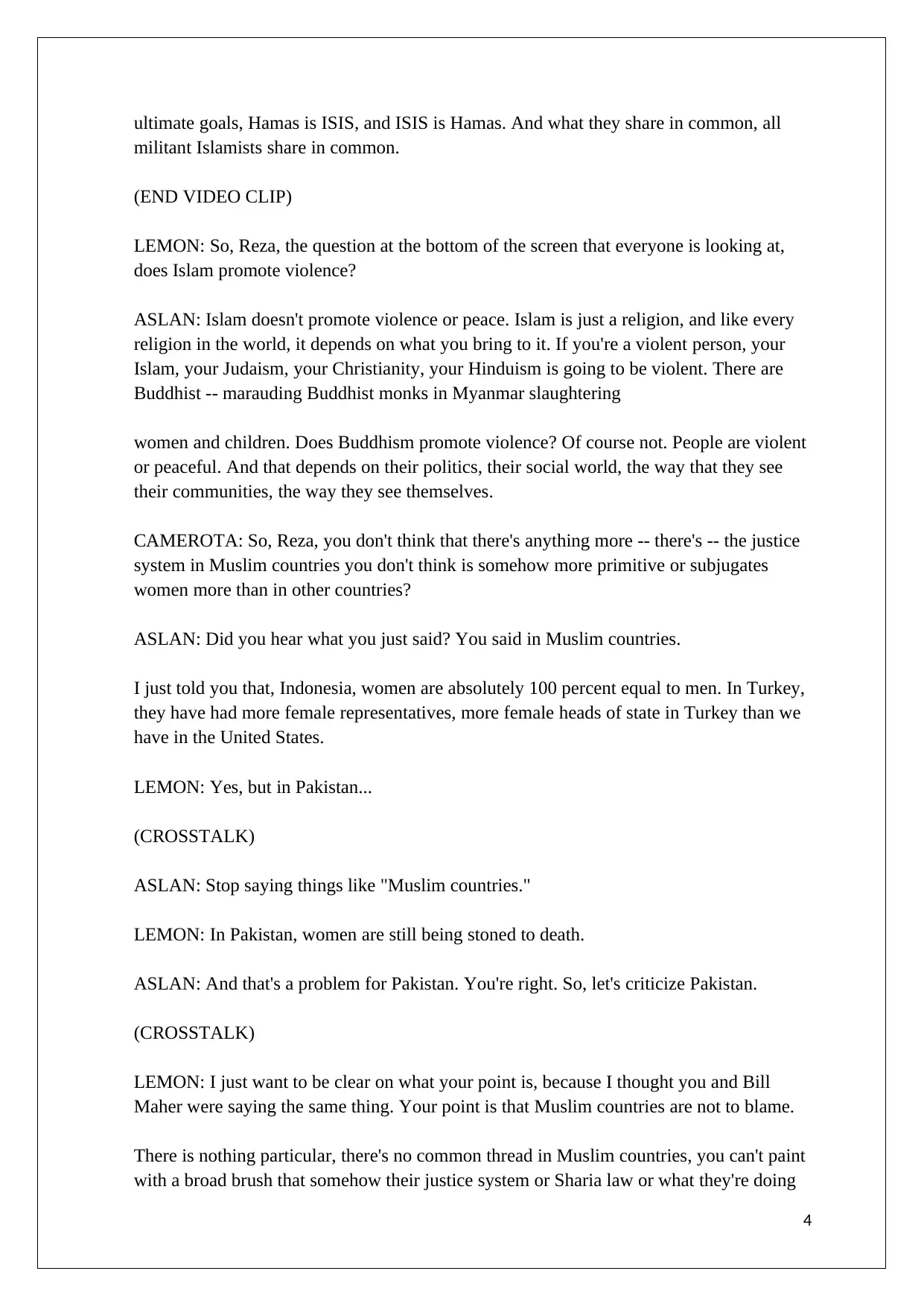
ultimate goals, Hamas is ISIS, and ISIS is Hamas. And what they share in common, all
militant Islamists share in common.
(END VIDEO CLIP)
LEMON: So, Reza, the question at the bottom of the screen that everyone is looking at,
does Islam promote violence?
ASLAN: Islam doesn't promote violence or peace. Islam is just a religion, and like every
religion in the world, it depends on what you bring to it. If you're a violent person, your
Islam, your Judaism, your Christianity, your Hinduism is going to be violent. There are
Buddhist -- marauding Buddhist monks in Myanmar slaughtering
women and children. Does Buddhism promote violence? Of course not. People are violent
or peaceful. And that depends on their politics, their social world, the way that they see
their communities, the way they see themselves.
CAMEROTA: So, Reza, you don't think that there's anything more -- there's -- the justice
system in Muslim countries you don't think is somehow more primitive or subjugates
women more than in other countries?
ASLAN: Did you hear what you just said? You said in Muslim countries.
I just told you that, Indonesia, women are absolutely 100 percent equal to men. In Turkey,
they have had more female representatives, more female heads of state in Turkey than we
have in the United States.
LEMON: Yes, but in Pakistan...
(CROSSTALK)
ASLAN: Stop saying things like "Muslim countries."
LEMON: In Pakistan, women are still being stoned to death.
ASLAN: And that's a problem for Pakistan. You're right. So, let's criticize Pakistan.
(CROSSTALK)
LEMON: I just want to be clear on what your point is, because I thought you and Bill
Maher were saying the same thing. Your point is that Muslim countries are not to blame.
There is nothing particular, there's no common thread in Muslim countries, you can't paint
with a broad brush that somehow their justice system or Sharia law or what they're doing
4
militant Islamists share in common.
(END VIDEO CLIP)
LEMON: So, Reza, the question at the bottom of the screen that everyone is looking at,
does Islam promote violence?
ASLAN: Islam doesn't promote violence or peace. Islam is just a religion, and like every
religion in the world, it depends on what you bring to it. If you're a violent person, your
Islam, your Judaism, your Christianity, your Hinduism is going to be violent. There are
Buddhist -- marauding Buddhist monks in Myanmar slaughtering
women and children. Does Buddhism promote violence? Of course not. People are violent
or peaceful. And that depends on their politics, their social world, the way that they see
their communities, the way they see themselves.
CAMEROTA: So, Reza, you don't think that there's anything more -- there's -- the justice
system in Muslim countries you don't think is somehow more primitive or subjugates
women more than in other countries?
ASLAN: Did you hear what you just said? You said in Muslim countries.
I just told you that, Indonesia, women are absolutely 100 percent equal to men. In Turkey,
they have had more female representatives, more female heads of state in Turkey than we
have in the United States.
LEMON: Yes, but in Pakistan...
(CROSSTALK)
ASLAN: Stop saying things like "Muslim countries."
LEMON: In Pakistan, women are still being stoned to death.
ASLAN: And that's a problem for Pakistan. You're right. So, let's criticize Pakistan.
(CROSSTALK)
LEMON: I just want to be clear on what your point is, because I thought you and Bill
Maher were saying the same thing. Your point is that Muslim countries are not to blame.
There is nothing particular, there's no common thread in Muslim countries, you can't paint
with a broad brush that somehow their justice system or Sharia law or what they're doing
4
Secure Best Marks with AI Grader
Need help grading? Try our AI Grader for instant feedback on your assignments.
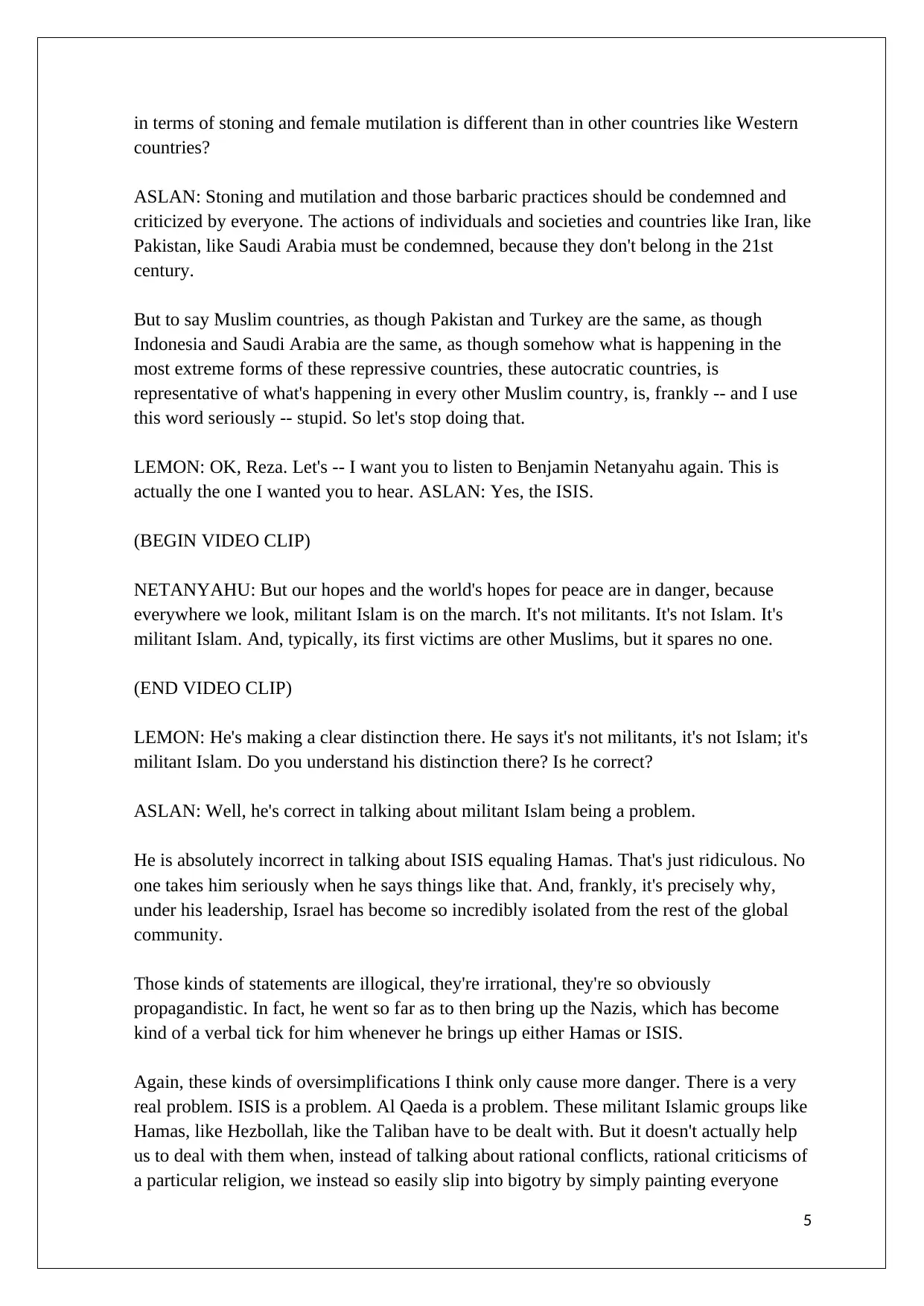
in terms of stoning and female mutilation is different than in other countries like Western
countries?
ASLAN: Stoning and mutilation and those barbaric practices should be condemned and
criticized by everyone. The actions of individuals and societies and countries like Iran, like
Pakistan, like Saudi Arabia must be condemned, because they don't belong in the 21st
century.
But to say Muslim countries, as though Pakistan and Turkey are the same, as though
Indonesia and Saudi Arabia are the same, as though somehow what is happening in the
most extreme forms of these repressive countries, these autocratic countries, is
representative of what's happening in every other Muslim country, is, frankly -- and I use
this word seriously -- stupid. So let's stop doing that.
LEMON: OK, Reza. Let's -- I want you to listen to Benjamin Netanyahu again. This is
actually the one I wanted you to hear. ASLAN: Yes, the ISIS.
(BEGIN VIDEO CLIP)
NETANYAHU: But our hopes and the world's hopes for peace are in danger, because
everywhere we look, militant Islam is on the march. It's not militants. It's not Islam. It's
militant Islam. And, typically, its first victims are other Muslims, but it spares no one.
(END VIDEO CLIP)
LEMON: He's making a clear distinction there. He says it's not militants, it's not Islam; it's
militant Islam. Do you understand his distinction there? Is he correct?
ASLAN: Well, he's correct in talking about militant Islam being a problem.
He is absolutely incorrect in talking about ISIS equaling Hamas. That's just ridiculous. No
one takes him seriously when he says things like that. And, frankly, it's precisely why,
under his leadership, Israel has become so incredibly isolated from the rest of the global
community.
Those kinds of statements are illogical, they're irrational, they're so obviously
propagandistic. In fact, he went so far as to then bring up the Nazis, which has become
kind of a verbal tick for him whenever he brings up either Hamas or ISIS.
Again, these kinds of oversimplifications I think only cause more danger. There is a very
real problem. ISIS is a problem. Al Qaeda is a problem. These militant Islamic groups like
Hamas, like Hezbollah, like the Taliban have to be dealt with. But it doesn't actually help
us to deal with them when, instead of talking about rational conflicts, rational criticisms of
a particular religion, we instead so easily slip into bigotry by simply painting everyone
5
countries?
ASLAN: Stoning and mutilation and those barbaric practices should be condemned and
criticized by everyone. The actions of individuals and societies and countries like Iran, like
Pakistan, like Saudi Arabia must be condemned, because they don't belong in the 21st
century.
But to say Muslim countries, as though Pakistan and Turkey are the same, as though
Indonesia and Saudi Arabia are the same, as though somehow what is happening in the
most extreme forms of these repressive countries, these autocratic countries, is
representative of what's happening in every other Muslim country, is, frankly -- and I use
this word seriously -- stupid. So let's stop doing that.
LEMON: OK, Reza. Let's -- I want you to listen to Benjamin Netanyahu again. This is
actually the one I wanted you to hear. ASLAN: Yes, the ISIS.
(BEGIN VIDEO CLIP)
NETANYAHU: But our hopes and the world's hopes for peace are in danger, because
everywhere we look, militant Islam is on the march. It's not militants. It's not Islam. It's
militant Islam. And, typically, its first victims are other Muslims, but it spares no one.
(END VIDEO CLIP)
LEMON: He's making a clear distinction there. He says it's not militants, it's not Islam; it's
militant Islam. Do you understand his distinction there? Is he correct?
ASLAN: Well, he's correct in talking about militant Islam being a problem.
He is absolutely incorrect in talking about ISIS equaling Hamas. That's just ridiculous. No
one takes him seriously when he says things like that. And, frankly, it's precisely why,
under his leadership, Israel has become so incredibly isolated from the rest of the global
community.
Those kinds of statements are illogical, they're irrational, they're so obviously
propagandistic. In fact, he went so far as to then bring up the Nazis, which has become
kind of a verbal tick for him whenever he brings up either Hamas or ISIS.
Again, these kinds of oversimplifications I think only cause more danger. There is a very
real problem. ISIS is a problem. Al Qaeda is a problem. These militant Islamic groups like
Hamas, like Hezbollah, like the Taliban have to be dealt with. But it doesn't actually help
us to deal with them when, instead of talking about rational conflicts, rational criticisms of
a particular religion, we instead so easily slip into bigotry by simply painting everyone
5
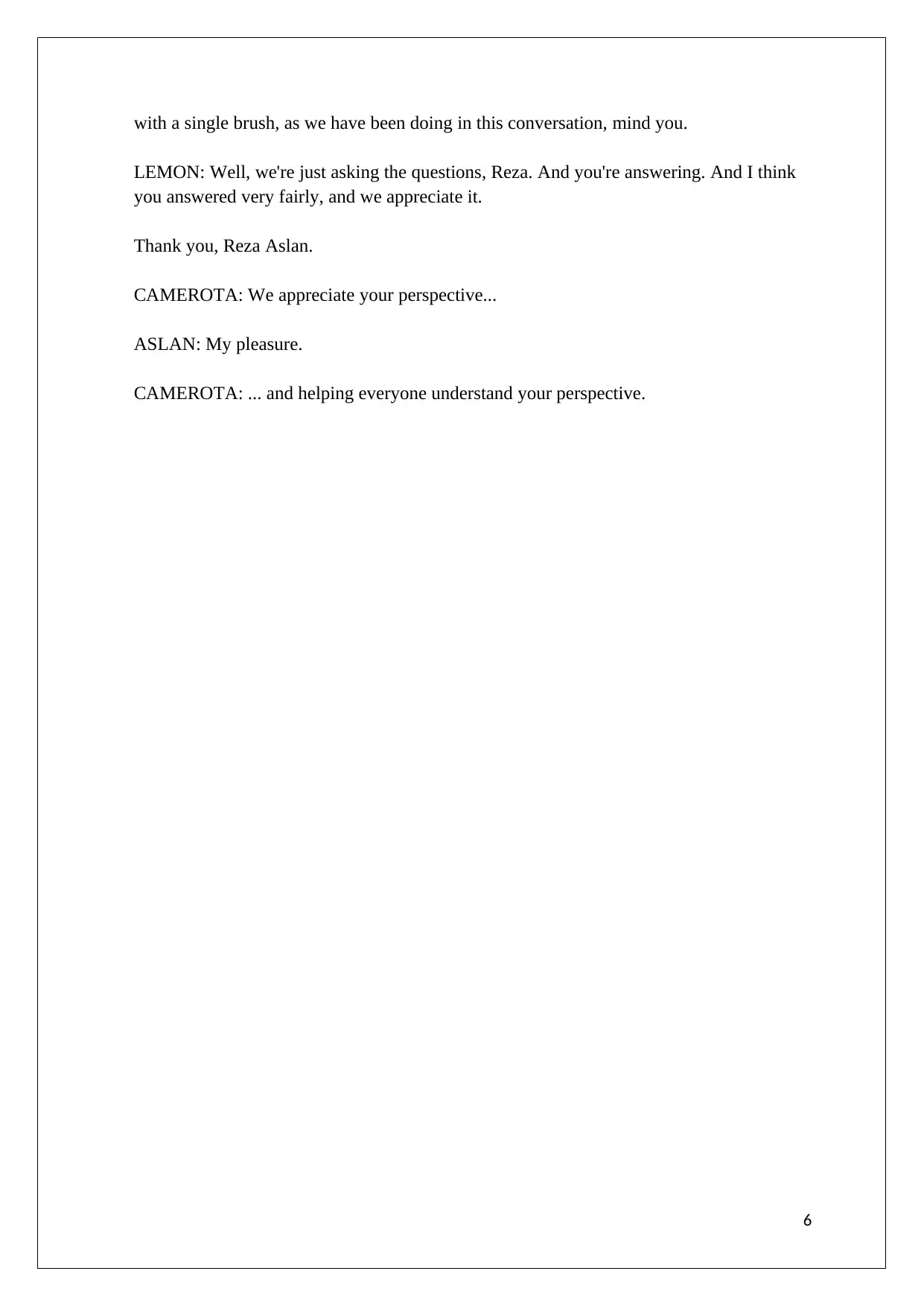
with a single brush, as we have been doing in this conversation, mind you.
LEMON: Well, we're just asking the questions, Reza. And you're answering. And I think
you answered very fairly, and we appreciate it.
Thank you, Reza Aslan.
CAMEROTA: We appreciate your perspective...
ASLAN: My pleasure.
CAMEROTA: ... and helping everyone understand your perspective.
6
LEMON: Well, we're just asking the questions, Reza. And you're answering. And I think
you answered very fairly, and we appreciate it.
Thank you, Reza Aslan.
CAMEROTA: We appreciate your perspective...
ASLAN: My pleasure.
CAMEROTA: ... and helping everyone understand your perspective.
6
1 out of 6
Related Documents
Your All-in-One AI-Powered Toolkit for Academic Success.
+13062052269
info@desklib.com
Available 24*7 on WhatsApp / Email
![[object Object]](/_next/static/media/star-bottom.7253800d.svg)
Unlock your academic potential
© 2024 | Zucol Services PVT LTD | All rights reserved.





